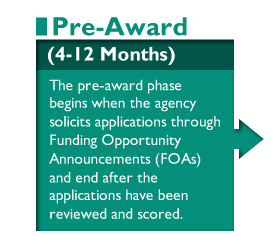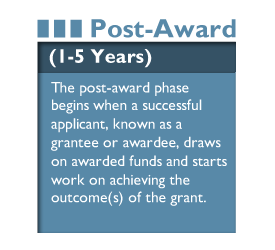Life Cycle Overview
The Grants Life Cycle has three major stages: pre-award, award, and post-award. The applicant / recipient and awarding agency have unique roles in each stage. The duration of an award may vary depending on the nature of the project. General descriptions of each stage are provided below; however, actual assistance awards may differ due to unique circumstances or legislation requirements. For a more in-depth look at the grants process, please visit the Department of Health and Human Services website.
Grants Life Cycle
Pre-Award
The pre-award phase begins when the agency plans for the solicitation through Notice of Funding Opportunity (NOFOs) and ends after applications have been reviewed and scored. Applicants submit assurances and certifications verifying compliance with federal statutes as part of the pre-award process.
Key Pre-Award Activities
| Applicant | CDC |
|---|---|
|
|
Most grants are made through a competitive application process; however, many grants are noncompetitive. A grant may be awarded without Competition if either Congress or the CDC determines that a single organization is the best resource. Noncompetitive grants can include new awards, supplements, extensions, and continuations.
The competitive process begins with the awarding agency (i.e., CDC) publishing the NOFO on Grants.gov. The NOFO describes in detail the purpose of the award, eligibility requirements, estimated award amount(s), application deadline, funding time period, and method of selection.
Applications that meet the eligibility requirements, respond to the established requirements of the NOFO, and are submitted on-time are reviewed and scored based on the criteria published in the NOFO.
Research applications are reviewed for both scientific merit and ability to meet programmatic needs. Non-research applications are reviewed for ability to meet programmatic needs.
For more information visit, How to Apply.
Award
After the review of all applications, the awarding agency will determine whether an award will be made. If an applicant is successful, then the agency will notify the applicant by issuing a Notice of Award (NoA). If the applicant is unsuccessful, the agency will notify the applicant, via correspondence, and provide specific details relating to the decision.
Non-research grant recipients will be assigned to your grants in GrantSolutions. The Principal Investigator and the Authorizing Official noted on the grant application will be assigned automatically or be issued new GrantSolutions accounts if needed. All non-research grants are managed in GrantSolutions. You can learn more on our GrantSolutions for Grantees web page.
Key Award Activities
| Recipient | CDC |
|---|---|
|
|
Awards are made according to rank, score, and specific selection criteria stated in the NOFO and are subject to availability of funds.
For more information, visit Already have a CDC Grant?
Post-Award
The post-award phase begins when a successful applicant, known as a known as a recipient, expends awarded funds and starts work on achieving the outcome(s) of the grant. This phase encompasses ongoing monitoring of the funded project.
The post-award phase concludes after the period of performance ends and closeout activities are completed.
Key Post-Award Activities
| Recipient | CDC |
|---|---|
|
|
Upon receipt of a NoA, recipient begin performing the proposed activities in accordance with the terms and conditions of the NoA.
Recipient provide periodic programmatic and financial reports to the awarding agency, as required by the terms and conditions of the NoA . The agency reviews the programmatic and financial reports and works with recipient throughout the post-award phase to ensure all required documentation is submitted and accurate.
Closeout occurs after the end of the period of performance. This is a process that ensures recipient have met all financial and reporting requirements.
For more information, visit Already have a CDC Grant?
Grants Management Officers/Specialists (GMO/GMS)
- The GMO (https://www.cdc.gov/grants/dictionary/index.html#gmo)and GMS (https://www.cdc.gov/grants/dictionary/index.html#gms)are both responsible for the day-to-day business management and administrative functions of awards.
- The GMO(https://www.cdc.gov/grants/dictionary/index.html#gmo) serves as the counterpart to the business officer of the recipient (https://www.cdc.gov/grants/dictionary/index.html#recipient)organization. The GMO(https://www.cdc.gov/grants/dictionary/index.html#gmo) ensures that CDC and recipient fulfill requirements of laws, regulations, and administrative policies.
- The GMS is the primary contact of recipient for business and administrative matters of grant awards.
Program/Project Officers (PO)
- The PO is responsible for the programmatic, scientific, and/or technical aspects of awards.
- The PO’s responsibilities include, but are not limited to, developing research initiatives and research (https://www.cdc.gov/grants/dictionary/index.html#research)training programs to meet the CIO’s mission; and working in partnership with grants management on post-award administration, including review of progress reports, participation in site visits, and other activities. The PO provides technical assistance to recipient in the performance of their project.
- Page last reviewed: May 5, 2017
- Page last updated: September 8, 2017
- Content source:
- Maintained By:




 ShareCompartir
ShareCompartir



